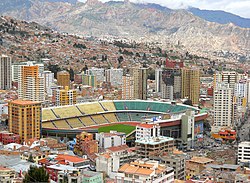This article needs to be updated.(May 2024) |
This article needs additional citations for verification .(September 2015) |






Many countries have a national sport stadium, which typically serves as the primary or exclusive home for one or more of a country's national representative sports teams. The term is most often used in reference to an association football stadium. Usually, a national stadium will be in or very near a country's capital city or largest city. It is generally (but not always) the country's largest and most lavish sports venue with a rich history of hosting a major moment in sports (e.g. FIFA World Cup, Olympics, etc.). In many, but not all cases, it is also used by a local team. Many countries, including Spain and the United States, do not have a national stadium designated as such; instead matches are rotated throughout the country. The lack of a national stadium can be seen as advantageous as designating a single stadium would limit the fan base capable of realistically attending matches as well as the concern of the cost of transportation, especially in the case of the United States due to its geographical size and high population.
Contents
- Afghanistan
- Albania
- Algeria
- American Samoa
- Andorra
- Angola
- Antigua and Barbuda
- Argentina
- Armenia
- Aruba
- Australia
- Austria
- Azerbaijan
- Bahamas
- Bahrain
- Bangladesh
- Barbados
- Belarus
- Belgium
- Belize
- Benin
- Bermuda
- Bhutan
- Bolivia
- Bosnia and Herzegovina
- Botswana
- Brazil
- Brunei Darussalam
- Bulgaria
- Burkina Faso
- Burundi
- Cambodia
- Cameroon
- Canada
- Cape Verde
- Central African Republic
- Chad
- Chile
- China
- Colombia
- Comoros
- Democratic Republic of the Congo
- Republic of the Congo
- Cook Islands
- Costa Rica
- Cuba
- Cyprus
- Czech Republic
- Denmark
- Djibouti
- Dominica
- Dominican Republic
- East Timor
- Ecuador
- Egypt
- El Salvador
- Equatorial Guinea
- Eritrea
- Estonia
- Eswatini
- Ethiopia
- Faroe Islands
- Fiji
- Finland
- France
- Gabon
- Gambia
- Georgia
- Germany
- Ghana
- Greece
- Greenland
- Grenada
- Guatemala
- Guinea
- Guinea-Bissau
- Guyana
- Haiti
- Honduras
- Hong Kong
- Hungary
- Iceland
- India
- Indonesia
- Iran
- Iraq
- Ireland
- Italy
- Ivory Coast
- Jamaica
- Japan
- Jordan
- Kazakhstan
- Kenya
- Kiribati
- Republic of Korea
- Democratic People's Republic of Korea
- Kosovo
- Kuwait
- Kyrgyzstan
- Latvia
- Lesotho
- Lebanon
- Liberia
- Libya
- Liechtenstein
- Lithuania
- Luxembourg
- Macau
- Malawi
- Malaysia
- Maldives
- Mali
- Malta
- Martinique
- Mauritania
- Mexico
- Moldova
- Monaco
- Montenegro
- Morocco
- Myanmar
- Namibia
- Nepal
- Netherlands
- Nicaragua
- Niger
- Nigeria
- Norway
- North Macedonia
- Oman
- Pakistan
- Palau
- Panama
- Papua New Guinea
- Paraguay
- Peru
- Philippines
- Poland
- Portugal
- Puerto Rico
- Qatar
- Romania
- Russia
- Rwanda
- Saint Kitts and Nevis
- Saint Lucia
- Saint Vincent and the Grenadines
- San Marino
- Serbia
- Singapore
- Slovakia
- Slovenia
- Somalia
- Spain
- Sierra Leone
- Solomon Islands
- South Africa
- Sri Lanka
- Suriname
- Sweden
- Switzerland
- Syria
- Taiwan
- Tajikistan
- Tanzania
- Thailand
- Togo
- Trinidad and Tobago
- Turkey
- Turkmenistan
- Tunisia
- Uganda
- Ukraine
- United Arab Emirates
- United Kingdom
- England
- Scotland
- Wales
- Northern Ireland
- England and Wales
- United States
- Uruguay
- Uzbekistan
- Vatican City
- Venezuela
- Vietnam
- Zambia
- Zimbabwe
- See also
- References
A list of national stadiums follows: